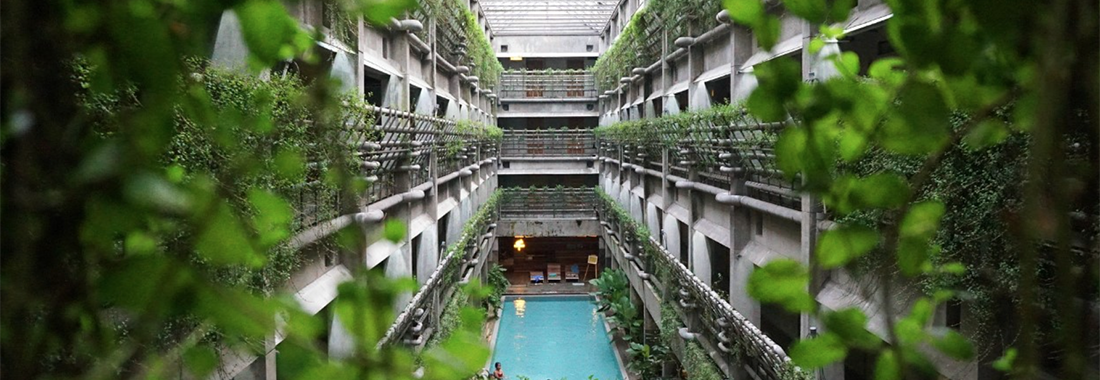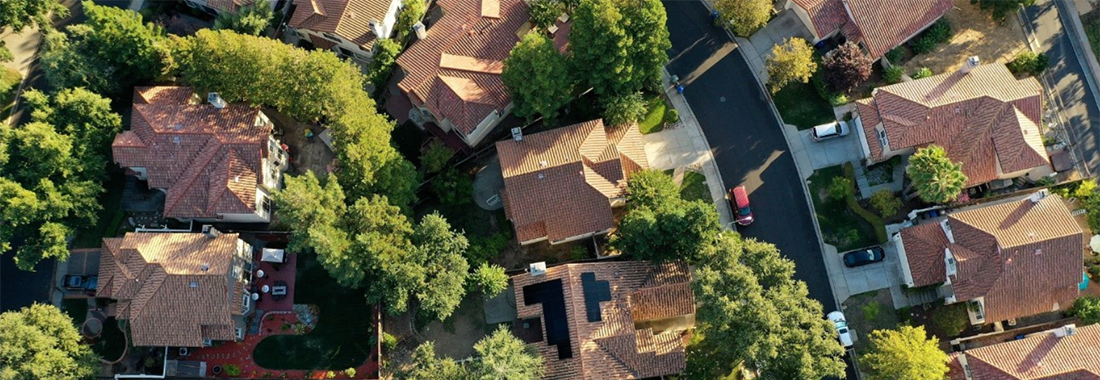We can try to be the smartest people in the world, still we might not be able to be 100% efficient. Our house conspires against our goodwill.
Current technologies make it possible to make "passive" houses. But what is a passive house?
Passive dwellings are buildings capable of maintaining thermal well-being without the need for heating or cooling systems. Passive houses need about 85% less energy than a standard home.
To make a house passive, it is necessary to properly insulate the house from the inside, simultaneously ensuring proper transpiration and insulation that make the internal temperature and healthiness constant (avoiding the formation of mold and humidity inside). To achieve this, it is necessary to build walls, floors and roofs in order to minimize dispersion, increase performance and to adopt fixtures that minimize the passage of cold and heat, as well as noise.
These homes often turn out to be healthy also due to the use of materials of natural origin, according to the dictates of green building and green architecture.
A strong help in minimizing consumption is given by home automation systems, both inside homes and in common condominium spaces: the simplest example is that of sensors that detect movement and determine the switching on of the lights of the stairs and of the hallways.
CAN PASSIVE HOUSES BE SELF-SUFFICIENT?
These homes can now be almost completely self-sufficient, with the installation of solar thermal panels for the production of hot water (but also for heating), photovoltaic panels for the production of electricity and storage systems. In a house that has photovoltaic panels, it is possible to cook without gas, as well as heating; with adequate insulation, heat pumps get used more efficiently. In some cases, the use of small-scale geothermal which, using the water from the heating system, exploits the temperature difference between the atmosphere and the ground, allows for the integration of these systems to be maximized.
In Italy, the forerunner with a consolidated experience CasaClima Agency in Bolzano.
Undoubtedly, it is easier to transform an independent house into a passive house, but in Italy and Europe there are examples of energy efficiency and green building also applied to condominiums and also to social housing. And the green systems on the walls and roofs are widespread in many urban experiences: in the roofs of buildings in different cities around the world there are already gardens but also condominium gardens to ensure food supply and better control of the temperature of the houses.
WHAT ARE THE COSTS OF A SELF-SUFFICIENT PASSIVE HOUSE?
The cost of building a passive house is only 10-20% (2000 euros per square meter), in the face of energy savings of at least 85% compared to a traditional house. This makes the building of a passive house absolutely competitive.
If throwing down the house to make it passive can be problematic and expensive, it is easier to equip it with a photovoltaic system with storage, the price of which has gone down from year to year and today is much below the price of a small car, net of the total cost of the works. And even lower than the cost of a solar thermal system. And if we talk about small cars, today, with petrol at around 2 euros per liter, the hybrid becomes more and more convenient and the electric one could be, with a constantly growing demand, if the infrastructure for recharging were more capillary in the distribution and suitable for different technologies.
The only way to weaken war scenarios with the current Russian-Ukrainian one, in fact, is to make the European Union less and less dependent on foreign, through greater investments towards the reduction of energy consumption, favoring the production of renewable energy.
But if it's all so beautiful and easy, why are we still talking about the energy transition as something futuristic after 20 years?
Read the previous episode on 22 tips on how to reduce energy consumption.

Vania Statzu
Environmental Economist MEDSEA
Latest news

A Forest for Bees Takes Root in Sardinia: Restoring Nature, Supporting Pollinators
The planting operations for the first Forest for Bees installation—a forest for bees—have been completed in Sennariolo (OR). This is a special one-hectare forest dedicated to bees and pollinators, essential insects for food…

MEDSEA Launches the Wetland4Change Project in Terralba to test and validate climate change's solutions
On Friday, March 14, 2025, in the council chamber of Terralba, MEDSEA held a meeting with the Municipality of Terralba to officially introduce Wetland4Change to stakeholders (productive activities, as well as institutional…

In Crete with ARTEMIS to protect seagrass meadows: 2nd Consortium Meeting
From March 4th to 6th, 2025, Heraklion (Crete) hosted the mid-term meeting of the ARTEMIS Interreg Euro-MED Natural Heritage project, organized by the Hellenic Marine Research Centre. This was a crucial moment to…

MEDSEA Heads to Tallinn for the Blue4All Consortium Meeting
Last January, the Blue4All project team gathered in Tallinn for the Consortium Meeting, marking the project's halfway point. The event, hosted by the local partner Keskkonnaamet/Estonian Environmental Board and the University of Tartu, brought together all 22 project partners from across…

ImPelaghiamoci: A Year of Initiatives to Learn About and Protect Cetaceans with the Municipality of Sassari
Promoting greater knowledge of the resident cetaceans in the Pelagos Sanctuary*, a transboundary marine protected area encompassing France, Liguria, Tuscany, and Sardinia, to improve the protection and conservation of these species…

Reforestation Operations Resume in Montiferru: A Forest for Bees by MEDSEA
Reforestation efforts in Montiferru, led by MEDSEA, are back on track. Following the planting of the first 5 hectares of olive trees, holm oaks, and Mediterranean shrubs, the focus now shifts to melliferous plants to…

25 Events in Sardinia for World Wetlands Day
Wetlands such as ponds, lagoons, lakes, rivers, and peatlands form an endless world of aquatic ecosystems. In Sardinia, the call to explore these habitats is open this February with the Sardinian edition of World Wetlands Day.

COASTRUST: Launching Sustainable Coastal Management in Domus de Maria Sardinia
The activities of the COASTRUST project, funded by the European Interreg Euro-MED program, have officially begun in Sardinia. The initiative aims to promote shared environmental management in the Mediterranean's coastal areas, addressing anthropogenic pressures…

Join the World Wetlands Day Sardinia 2025 Calendar: register your Event by January, 22nd
World Wetlands Day is celebrated every year on February 2, marking the adoption of the Convention on Wetlands signed on February 2, 1971, in Ramsar, on the shores of the…

MEDSEA joins the Camargue Red Alert with the Mediterranean Alliance for Wetlands to save birdlife
The MEDSEA Foundation has officially joined 73 other international organizations in signing the Camargue Red Alert, a collective call to action to safeguard the Camargue wetlands in France.

Wetland4Change: MEDSEA in Valencia to Explore Natural Climate Solutions Through Wetlands
The MEDSEA team participated in the second Consortium meeting of the Wetland4Change project in Valencia from November 26 to 28, 2024. The meeting was organized by local project partners, the…

Malta’s First Posidonia Meadow Restoration Project Led by MEDSEA Foundation
Different islands, but similar issues for marine ecosystems, which are heavily threatened by unregulated anchoring from recreational boating and illegal trawling. In Malta, as in Sardinia, the damage is particularly…

We are all at 'Valencia'-like risk, and here’s why
Le recenti inondazioni a Valencia sono un esempio tangibile di come gli eventi estremi legati al cambiamento climatico stiano aumentando in frequenza, intensità e durata, colpendo duramente il Mediterraneo, un vero e proprio…

Monitoring of Posidonia oceanica Meadows Begins in the Marine Protected Area of Capo Testa Punta Falcone
The monitoring activities of the Posidonia oceanica meadows in the Marine Protected Area (MPA) of Capo Testa Punta Falcone, located in Santa Teresa Gallura, have officially begun. In recent days, the marine…

MEDSEA joined the 7th TransformAr Consortium Meeting in Exeter
In Late September, the seventh Consortium Meeting of TransformAr took place in Exeter in South West England, organised by the partner Westcountry Rivers Trust, who are coordinating the Nature Based solutions in the…

Architecture and Environment of Wetlands at Costa Produttiva, September 8-14 in Marceddì
From September 8 to 14, Marceddì (OR) hosted Costa Produttiva, a multidisciplinary workshop that combines research, innovation, and sustainability for the future of our coasts. Organized by the DICAAR of the…
- 1
- 2
- 3
- 4



